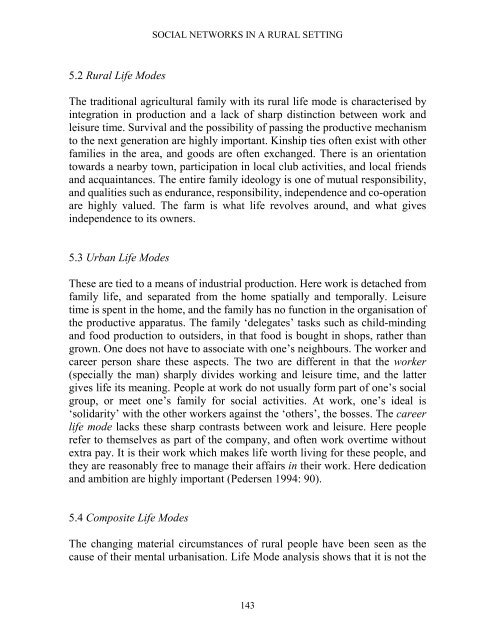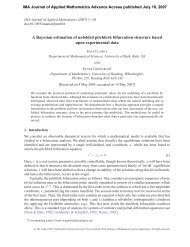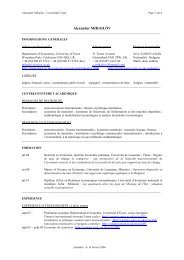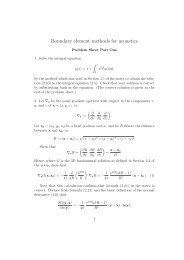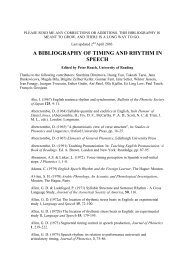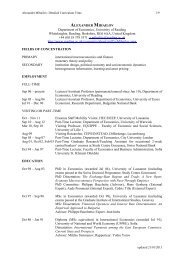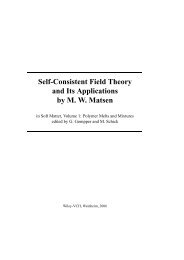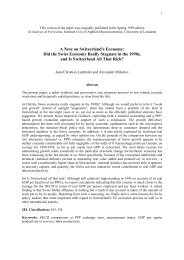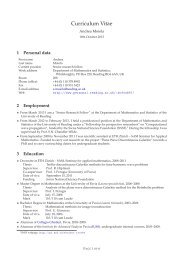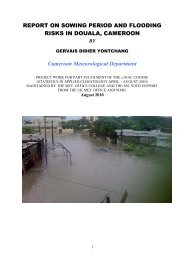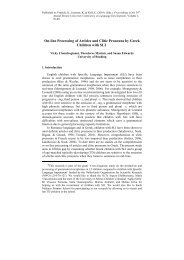Reading Working Papers in Linguistics 4 (2000) - The University of ...
Reading Working Papers in Linguistics 4 (2000) - The University of ...
Reading Working Papers in Linguistics 4 (2000) - The University of ...
You also want an ePaper? Increase the reach of your titles
YUMPU automatically turns print PDFs into web optimized ePapers that Google loves.
SOCIAL NETWORKS IN A RURAL SETTING<br />
5.2 Rural Life Modes<br />
<strong>The</strong> traditional agricultural family with its rural life mode is characterised by<br />
<strong>in</strong>tegration <strong>in</strong> production and a lack <strong>of</strong> sharp dist<strong>in</strong>ction between work and<br />
leisure time. Survival and the possibility <strong>of</strong> pass<strong>in</strong>g the productive mechanism<br />
to the next generation are highly important. K<strong>in</strong>ship ties <strong>of</strong>ten exist with other<br />
families <strong>in</strong> the area, and goods are <strong>of</strong>ten exchanged. <strong>The</strong>re is an orientation<br />
towards a nearby town, participation <strong>in</strong> local club activities, and local friends<br />
and acqua<strong>in</strong>tances. <strong>The</strong> entire family ideology is one <strong>of</strong> mutual responsibility,<br />
and qualities such as endurance, responsibility, <strong>in</strong>dependence and co-operation<br />
are highly valued. <strong>The</strong> farm is what life revolves around, and what gives<br />
<strong>in</strong>dependence to its owners.<br />
5.3 Urban Life Modes<br />
<strong>The</strong>se are tied to a means <strong>of</strong> <strong>in</strong>dustrial production. Here work is detached from<br />
family life, and separated from the home spatially and temporally. Leisure<br />
time is spent <strong>in</strong> the home, and the family has no function <strong>in</strong> the organisation <strong>of</strong><br />
the productive apparatus. <strong>The</strong> family ‘delegates’ tasks such as child-m<strong>in</strong>d<strong>in</strong>g<br />
and food production to outsiders, <strong>in</strong> that food is bought <strong>in</strong> shops, rather than<br />
grown. One does not have to associate with one’s neighbours. <strong>The</strong> worker and<br />
career person share these aspects. <strong>The</strong> two are different <strong>in</strong> that the worker<br />
(specially the man) sharply divides work<strong>in</strong>g and leisure time, and the latter<br />
gives life its mean<strong>in</strong>g. People at work do not usually form part <strong>of</strong> one’s social<br />
group, or meet one’s family for social activities. At work, one’s ideal is<br />
‘solidarity’ with the other workers aga<strong>in</strong>st the ‘others’, the bosses. <strong>The</strong> career<br />
life mode lacks these sharp contrasts between work and leisure. Here people<br />
refer to themselves as part <strong>of</strong> the company, and <strong>of</strong>ten work overtime without<br />
extra pay. It is their work which makes life worth liv<strong>in</strong>g for these people, and<br />
they are reasonably free to manage their affairs <strong>in</strong> their work. Here dedication<br />
and ambition are highly important (Pedersen 1994: 90).<br />
5.4 Composite Life Modes<br />
<strong>The</strong> chang<strong>in</strong>g material circumstances <strong>of</strong> rural people have been seen as the<br />
cause <strong>of</strong> their mental urbanisation. Life Mode analysis shows that it is not the<br />
143


